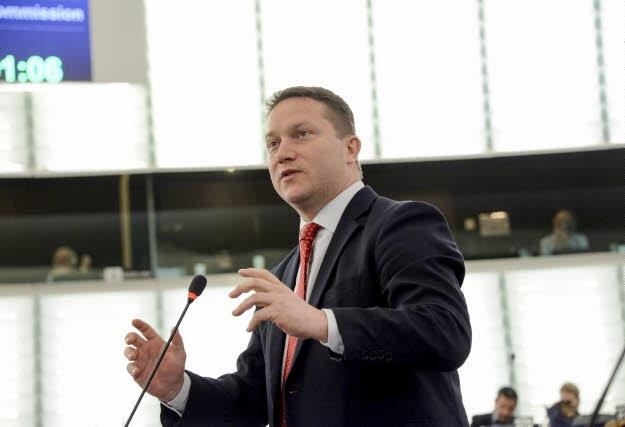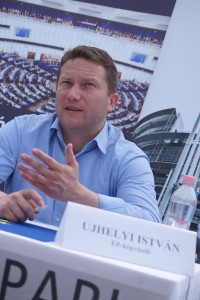Published: 9.9.2015
 It is not my duty to praise the European vision or to denounce it. My duty is to speak up when nobody else does; we social-democrats want a different kind of Europe as well!
It is not my duty to praise the European vision or to denounce it. My duty is to speak up when nobody else does; we social-democrats want a different kind of Europe as well!
More than a decade ago Hungary has officially become member of the European community, but we deluded ourselves into believing that the democratic transition is completed, that now we can finally enjoy all the social, financial, and indeed moral advantages of our EU membership – a sense of belonging to the developed, Westernized world. Fast-forward ten years and the overall picture looks gloomier: dreams seem to fade away, only blunt hopes replaced the initial enthusiasm. Of course this inevitably entails dissatisfied, critical voices. Make no mistake, they do have a point.
Yes, we might have a legitimate reason to say that the high hopes of our societies – even if often unrealistic – were only partially realized. I am not burying my head in the sand, I am very well aware what the masses are saying: “Europe is going down, its values are outdated”, or “the idea of multiculturalism has failed”to mention just a few of the most popular arguments. Serious accusations like these don’t just come out of thin air, perhaps the European project indeed needs to be re-evaluated. The long-term development of our continent will be defined by the answers we give to this increasingly pressing challenge. As a progressive, European social-democrat, there is only one way I consider viable.
The European Union started off as an elite club of the most developed Western countries, but sometimes untimely enlargements led to operational problems. The global financial crisis and the inadequate austerity policies, the reshuffle of global balance with Russia’s aggressive foreign policy, the shaky state of the Eurozone, and the escalating refugee issue all brought deep-rooted flaws to the limelight. Over the past few weeks it became obvious that in its current state the EU simply cannot give adequate answers to these challenges. Emmanuel Macron and Sigmar Garbriel, French and German economy ministers have called for a ‘two speed Europe’, a strengthened Eurozone with a common budgetary mechanism that would essentially form a new Union with federal institutions. The proposal would leave other EU member states out of the deal. Without doubt, this could be a watershed moment for the European project as deepening integration has long been the subject of never-ending debates. The choice is usually between a more federal Europe or a Europe based on nation-states. Unfortunately, advocates of the latter option often forget that it would inevitably pave the way towards even greater imbalance and instability, potentially threating the very existence of the European Union.
It is my duty to warn decision-makers across the Union: this debate is dominated by irresponsible political gamblers blinded by populism, ignorance, and the desire to divide Europe. Illiberalism is gaining momentum, walls are erected across the continent, common regulations and ideologies are trampled upon. Even Viktor Orban, the Hungarian prime minister – who undoubtedly resonates with his electorate – considered EU integration absolutely necessary not very long ago. Now, the famously populist prime minister echoes that the European Union is nothing more than a foolish attempt to bring nation states to their knees. Of course a responsible statesman would not engage in unsubstantiated accusations and would not be interested in amplifying the general ordeal, but this is only my personal opinion. I believe a responsible statesman would remain consistent in his communication even if it constitutes the minority yet strives to find solutions to a pressing problem.
“The future is always uncertain. But whoever understands the past first will succeed faster in the future.” – Said Orban earlier. Ironically, it is Orban himself who seems to ignore the teaching of many chronicles: history always repeats itself. Silent decades are interrupted by war, terror and social-political cataclysm – which is always followed by a new-born desire for consolidation and return to fundamental human values. This is when the pillars of Europe are laid down again and again. The current symptoms we experience in Europe would suggest that another cataclysm is approaching – or worse, it is already unavoidable. We must demonstrate that lessons of the past have been learnt: populist, aggressive politics never resolves anything, but isolates the one exercising it. Those who reject a common approach to challenges are sacrificing long-term solutions for short-term personal popularity. To continue our allegory: if one pillar is wobbling the entire building can collapse.
This is why parties like Fidesz or Jobbik are tremendously dangerous as they reject common EU solutions and prefer egoistic nationalism instead. This is why Syriza’s approach to common European problems is destructive – even if many leftists praise them as some kind of Messiah. This is why the direction Spain and Portugal are heading to before elections is worrying and alarming. And this is precisely why the hypocrite ideology of parties like UKIP represent is absolutely disgraceful.
Indeed, the future of Europe is at stake today. In its current state the European Union simply cannot deal with both the internal and external threats at the same time. In order to avoid bloody conflicts and even greater social tension, we have to fix those wobbly pillars first. Let me put forward a concrete example: the refugee crisis is a hugely pressing issue, but building walls arbitrarily is not the right response when the same country keeps refusing to take part in any comprehensive EU initiative.
Basically, the Hungarian government did as much as it served its ends, than called in sick when the joint work was about to start. Of course Orban’s freedom fighter image shapes the actions of government authorities, but surely it also represents a deep-rooted social problem: while we like to complain about the quality of public services, we like to adore tax evaders for their wit even more.
Europe must remain unified if we want to find a sustainable solution to tackle the migration crisis. We must recognise that self-centred nationalism only fuels antagonism, barely solving anything at all – or perhaps until the next elections only… This is a dangerous, slippery slope. In this world nation states race against each other, the more powerful ones selfishly subduing their weaker counterparts in order to force out unfavourable deals and concessions. Walls will be erected throughout the continent again, free movement of workers will be limited, supertaxes will be introduced, isolation and segregation will prevail. We Hungarians won’t have the right to complain – this is exactly what we did to others.
 Are we, “freedom fighter” Hungarians ready to be part of a supranational European community? I doubt it. Is it worth it politically to stand for consolidation, integration, sobriety, amidst the loud voices of newfangled nationalism and reckless political adventurism? I think so. This is the only way for countries like Hungary to achieve long-term prosperity. I might be alone with this opinion but if we don’t make the right choice, we all will end up alone – and history has shown how it feels to be left completely alone.
Are we, “freedom fighter” Hungarians ready to be part of a supranational European community? I doubt it. Is it worth it politically to stand for consolidation, integration, sobriety, amidst the loud voices of newfangled nationalism and reckless political adventurism? I think so. This is the only way for countries like Hungary to achieve long-term prosperity. I might be alone with this opinion but if we don’t make the right choice, we all will end up alone – and history has shown how it feels to be left completely alone.
Yes, the European Union needs to change. It must react faster, make decisions quicker, and has to handle crisis situations more effectively. It is the ultimate responsibility of the collective European left and the Hungarian Socialist Party to be actively involved in the process. We will certainly do our part of the job.
As Viktor Orban wrote earlier in an article in the right-leaning Magyar Nemzet paper: “(…) truth is, since Hungary has been member of the community its citizens are often protected by the European Union – sometimes against their own government.” Oh, how right he was! We can even agree that the EU is far from being perfect. It needs institutional reforms and the EU Constitution must be amended carefully. If the Union strives to remain a key player in global politics and economy, its decision making processes must be re-evaluated and reformed for greater effectiveness. Illiberal nation states – like Orban’s Hungary today – are dangerous because they refuse to place the common good above their own short-term political interests. After all what might be desirable for the majority is not necessarily better for their “personal” minority. To put it simply: thinking responsibly as a community is not in their interest. This is precisely why Orban’s “rotten regime” must fall. If nobody stands up against his government and its actions, others might start flirting with his illiberal ideology. Personally speaking, I do not want to live in an illiberal state, and I am sure many of us share this view.
Yes, Europe is not perfect. Yes, we would like to change certain things too. Still, Europe remains to be the key to our long-term prosperity. I mean if we won’t destroy the very essence of it.
2015.09.01.